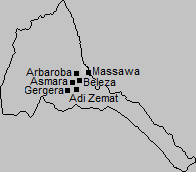Massawa Eritrea - February 12 2017
At 8:00 my Eagle Travel tour guide is present at the entrance of the Dahlak hotel for a one day tour through Massawa. The tour starts with a walking tour on the Tualud island, which is between the old port island Batse and the mainland of Massawa. The two islands and the mainland are connected by four lane causeways, which have recently been widened to facilitate the heavy cargo trucks bringing in the copper and gold ore from Bischa and other mining sites in Eritrea to the port of Massawa.
Massawa was one of the most important ports, and largest deep-water port on the Red Sea coast, occupied by Egyptian, Ottoman Turks. Italian, British and Ethiopian colonizers before its liberation in 1990. The various architectures still express the timeline of Massawa’s history. Batse island (the port district) is famous for its historical Turkish style buildings with their coral block carved walls, wooden shutters, balconies, and the Islamic historical places, like the many mosques and tomb and the 611 AD Sahaba Shrine, that reminds us that Massawa is the first city in Africa which hosted the followers of Prophet Mohammed.
Many of these buildings were destroyed by the 1921 earthquake and the 1990 aerial bombardments of the Ethiopian Air Force. It was a strategic target during the war of liberation. Massawa’s recovery is as dramatic as its survival: On some of the empty spaces, apartments and offices have been built in traditional style. Some ruins have remained as a monument. The most famous are the ruins of Gibi, the winter Imperial Palace of Haile Selassie, with Eritrea’s first elevator in the back of the building and the former Bank of Italy near the port entrance
The Italian colonialists built Massawa in the 1920’s to become the largest port on their East coast of Africa. Their influence and architecture is best seen on the Tualot/Tualud island with its government buildings and European residences, and broad, tree-lined streets. Italian architecture intermingles with modern buildings, built after 1991.
The island hosts a Catholic, an Orthodox and an Evangelical Church, as well as several major and basic hotels, the Villa Melotti, and the former railway station, and the memorial square with the three captured Ethiopian tanks. Eritrean Airlines and Eagle Travel have their offices on this island. Mussie explains that the name Tualot/Tualud is derived from the name of a place/lady selling suwa, a traditional home brewed beer like drink. So the traditional invitation for “let’s have a drink” would be “let’s go to Tualud”.
At the National Museum of Massawa we get a permit to visit the Sahaba Shrine. Visiting this historical place is almost impossible without assistance of a travel agent. And especially because it is Sunday today, so a museum worker will have to come from his house. So I am happy to be one of the happy few to have seen it all. Mussie asks me if I want to visit the museum as well. But I have visited the museum some years ago, and making pictures is not allowed. So we will drive to the port entrance to visit the Islamic Shrine instead.
The Shrine is surrounded by hundreds of sea containers and at a distance by hundreds of containers filled with copper and gold ore, ready for shipment to China. By now I know making pictures in this area is not allowed. So I just picture the shrine to prevent any discussions.
Just like yesterday we visit Batse, the old port district. In a makeshift tea bar next to the former Banca d’Ítalia we drink tea. When we leave and a want to pay, the lady refuses the money. I cannot believe it! Why on earth is Eritrea the only place on earth where they do not cheat, but pamper the tourist?
We walk the streets and alleys of the old town, passing the coral block houses and offices. Many restored or rebuilt, some ruined, or showing bullet holes as a reminiscence of the fierce fighting in 1990. In front of Bar Florida we have a coke and some rest and we have a chat with the owner of the bar and the other visitors.
Next place of interest is the small fisherman’s port, close to the high end Seghen International Hotel. At the end of a small dam stretching out into the water, we visit a dozen of traditional colorful fishing boats from Yemen, their fishing nets drying on the dam, and their children swimming and playing with a large floating fish container.
At my request, we also visit the salt ponds and Massawa Salt Works. The factory is closed on Sunday, but nevertheless we have nice views on the production sites. We also pass the workshops and factories in this industrial zone of Massawa.
Next, and last destination before returning to Asmara is Gurgussum Beach, with a beach hotel, family houses, café’s and a restaurant. It is a popular place to stay and swim, and during this time of Fenkil celebrations, the hotel is fully occupied. In one of the open air café’s we have another coke.
One can make a short camel ride on the beach for 100 Nakfa. Although I am scared to fall off, I feel I HAVE to do this. I hand my camera to Mussie for the picture. The camel is not happy with the fat tourist, but the very short ride is another item from my to do list successfully done. And again: without assistance of a tour guide the Gurgussum Beach is difficult to reach, as it is some 10 kilometers from the Massawa-Asmara road and there is only the options of an occasional mini bus, or an expensive taxi.
At 15:00 we return to Asmara with stops in Gahtelai for watermelons and some snacks, sold by the kids, in Ghinda for a drink, and near Nefasit to observe the local baboons. Around 18:00 we are back in Asmara. Thank you Mussie for the fantastic weekend and all your efforts to witness the official Fenkil ceremonies!
.Kidane Meheret Catholic Church - Tualud Massawa Eritrea.
Luna Hotel - Tualud Massawa Eritrea.
Public Transport - Tualud Massawa Eritrea.
Central Hotel - Tualud Massawa Eritrea.
Offices and apartments - Tualud Massawa Eritrea.
Red Sea Hotel - Tualud Massawa Eritrea.
Villa Melotti - Tualud Massawa Eritrea.
Raven - Tualud Massawa Eritrea.
Fenkil celebration at the local level - Tualud Massawa Eritrea.
Modern and traditional office - Tualud Massawa Eritrea.
Former Local Administration - Tualud Massawa Eritrea.
Entry of the port area - Batse Massawa Eritrea.
Oldtimer taxi - Batse Massawa Eritrea.
Coral block houses - Batse Massawa Eritrea.
New housing block in traditional style - Batse Massawa Eritrea.
Coral block houses - Batse Massawa Eritrea.
Sheik Derbush tomb - Batse Massawa Eritrea.
Sahaba Shrine - Batse Massawa Eritrea.
Sheik Hanifi Mosque - Batse Massawa Eritrea.
Shaafi mosque - Batse Massawa Eritrea.
Regional Administration - Massawa Housing Complex Eritrea.
Modern apartments - Massawa Housing Complex Eritrea.
Offices & apartments apartments - Massawa Housing Complex Eritrea.
Seghen Hotel - Mainland Massawa Eritrea.
Traditional fishing boat (dhow) - Mainland Massawa Eritrea.
Massawa Salt Works - Gherar Massawa Eritrea.
Lady selling salt - Road to Asmara Massawa Eritrea.
Massawa bus station - Massawa Eritrea.
Apartments - Road to Gurgusum Massawa Eritrea.
Gurgusum beach - Massawa Eritrea.
Gurgusum beach hotel & family houses - Massawa Eritrea.
Riding the camel on Gurgusum beach - Massawa Eritrea.
Dogali railway bridge - Massawa Eritrea.
Children selling snacks and lemmons - Ghatelay Eritrea.
Women roasting maize - Ghindae Eritrea.
Baboons in the mountains - Nefasit Eritrea.
This tour was prepared and sponsored by:
Eagle Travel and Tour Services Asmara.






































